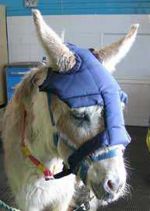Blindness - Donkey

As with many companion animal species, donkeys can survive extraordinarily well with impaired eyesight. Obviously, those individuals that lose their sight over months cope more easily than those that suffer an acute trauma. Experience shows that the use of ‘bumper’ helmets can help avoid further trauma to the head region, especially during any period of adjustment. The helmets used at The Donkey Sanctuary are specially made by a local company, based on an adaptation of a fly mask design.
It is common to see donkeys with deteriorating eyesight start to depend increasingly on their bonded companions for support and guidance. The sighted donkey will act as a second pair of eyes for its partially sighted or blind friend.
Reduced tear film production and subsequent dry eye is another very common ophthalmic problem with the aged donkey. This appears to increase susceptibility to corneal ulceration and general ocular discomfort. Individuals so affected can greatly benefit from the use of any of the tear replacement preparations available on the market.
Literature Search
Use these links to find recent scientific publications via CAB Abstracts (log in required unless accessing from a subscribing organisation).
Blindness in horses and donkeys publications
References
- Sprayson, T. (2008) The care of the geriatric donkey In Svendsen, E.D., Duncan, J. and Hadrill, D. (2008) The Professional Handbook of the Donkey, 4th edition, Whittet Books, Chapter 13
|
|
This page was sponsored and content provided by THE DONKEY SANCTUARY |
|---|
